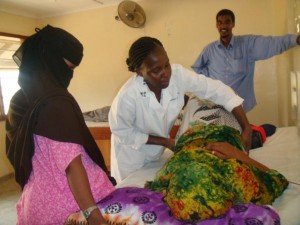She is only 20 years old, and has two children aged 2 years and 8 months. She is accompanied by her spouse who stays by her side throughout her period of stay at the hospital, which is a rare observation in the OF patients. Fatuma, like majority of women in this region illiterate and got married at 17ears. The couple have no idea what caused her stool incontinence. She had a normal second birth in the hospital and realised her stool was leaking slightly a few days later.
‘We heard on the radio about the camp and I brought her here, quips the husband’. On examination, the local VVF surgeon found her problem needed minor rectification which was carried out the following day, and her spouse couldn’t hide his gratitude. ‘We are thankful that AMREF has brought the service to Garissa, we came with three women from our area and they have been operated already, I was really looking forward to her going to theatre.’
‘We heard that the situation in the refugee camps is very bad, there are too many OF patients in Daadab. The health facilities there keep turning the patients back and giving them appointments for years that are never honoured; it is a frustration and they have really suffered’
Asked why women continue to give birth at home yet the health care is accessible, the husband tells us that ‘medics are like askaris, I can tell you because I took her to deliver at the hospital. They order people around and get impersonal. We need people who are concerned about the women as people not as subjects, explaining to them problems and solutions’. This sentiment is a rejoinder to concerns across the regions on attitudes of health care givers towards patients, which is probably one of the major barriers to accessing maternal health care. This issue requires ‘unpackaging’ to get to the root causes, which may be touching on policy issues rather than practice.















